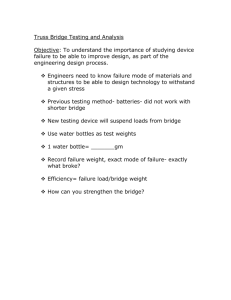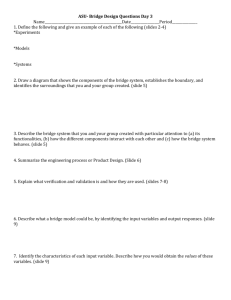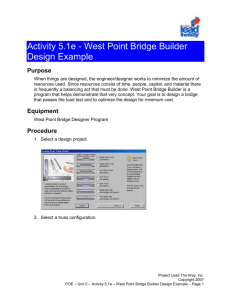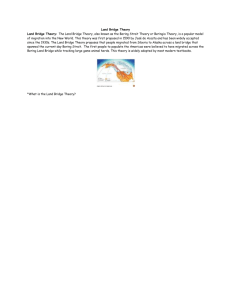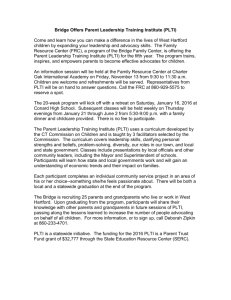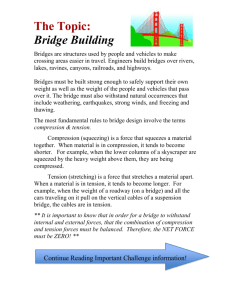File
advertisement
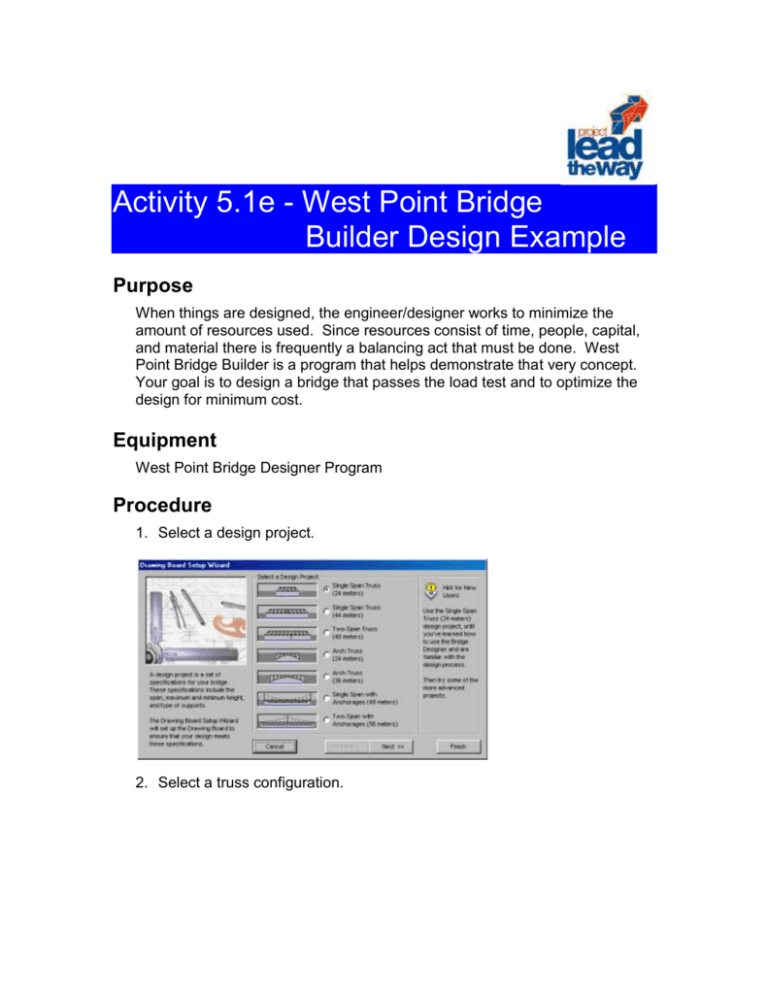
Activity 5.1e - West Point Bridge Builder Design Example Purpose When things are designed, the engineer/designer works to minimize the amount of resources used. Since resources consist of time, people, capital, and material there is frequently a balancing act that must be done. West Point Bridge Builder is a program that helps demonstrate that very concept. Your goal is to design a bridge that passes the load test and to optimize the design for minimum cost. Equipment West Point Bridge Designer Program Procedure 1. Select a design project. 2. Select a truss configuration. 3. Draw joints first using the Design Tool menu. 4. Draw members between the joints by selecting the member tool then clicking and dragging from one joint to the next. Note the joint numbers are shown in this figure. To follow the example step-by-step, create the members in the same order as shown. Member numbers are displayed by using the icon 5. Run a load test of the current configuration. In the main menu select Mode…Load Test.. Note: The program is using default properties for the members: 120 mm square bar made of Carbon Steel. These properties can be changed later. Watch the color of the member during the load test. Red indicates compression; blue is tension. The intensity of the color shows the force to strength ratio. Brighter colors show members that are loaded close to the maximum strength. If the force to strength ratio is greater than 1 the bridge collapses. For this example the bridge passes the load test on the first try. We were lucky! 6. Now begin to optimize the design to minimize the cost of the bridge. On the right side of the screen drag the edge of the member list see details of the load test. The cost is shown on the top of the screen. For this example the starting cost is $4860.02 7. The cost optimization procedure is outlined below: Change compression members from bars to tubes. Members in both compression and tension should be also be changed to tubes (in most cases this will reduce the cost). Change the size of the tubes to maximize the Force/Strength ratio for each member. Run a load test after each modification. Change the size of tension members to maximize Force/Strength ratio for each member. Group members to reduce product cost Modifying the material of each product and reduce size for further cost reduction. Going through the optimization process does take some time and may require dozens of runs. It is a trial and error process. Suggestions for success: work on one subgroup of members at a time for example do compression and tension members separately change only one variable at a time take notes of what changes were made and the results of each run use the main tool bar to go back to previous iterations if needed 8. Begin optimizing by selecting the top members 1-6 which are all in compression. Modify members 1-6 to be hollow tubes. You can select members in the graphics window or in the member list. Use the shift key to select adjacent members in the list or the ctrl key to select multiple members. Modify the size of each tube as needed to pass the load test. With 1-6 optimized as tubes the cost is reduced to $4614.99 9. Modify the remaining compression members 13,16,17,18,19,20,21 to be tubes and rerun the load test. This will reduce the cost to $3872.38 as shown here. 10. Now optimize all the tension members (7, 8, 9, 10, 11, 12, 14) by reducing the bar size so that the force to strength ratio is maximized. This change reduces the cost to $3048.48 as shown below. 11. This last iteration is the “minimized material cost” where each member is made as small as possible while meeting the requirements of the load test. If we select Report… Cost Calculations.. from the main menu we see a cost report which not surprisingly includes many different sizes for the members. The report shows 11 products are needed. From a practical point of view it would be a challenge and costly to have so many different sizes to deal with as the builder of the bridge. Note that the West Point Bridge Builder program includes a $100 fee for each product listed in the cost report. To reduce this cost, the engineer has to standardize the products and reduce the total number of products. 12. In general you can standardize the products by increasing the size of the smaller members to match some of the larger members. Yes the members will become heavier and less efficient but if the cost can be reduced while meeting the load test requirement then the tradeoff is favorable. After a few iterations the products can be standardized to reduce the cost to $2683.13 13. Another possible method of reducing cost is to select a higher grade material such as “High Strength Low Alloy Steel” or “Quenched & Tempered Steel “ and reduce the size of the member. The cost per pound of material is higher but the greater strength may allow you to reduce the size of the members and get an overall cost reduction. Modifying the material of the bars to a HSLA steel reduces the cost to $2590.40. Changing to Q&T bars and HSLA tubes showed no cost benefits even when the sizes were reduced. $2590.40 is the optimized cost for this bridge geometry. 14. If the geometry of the bridge is changed, for example the joint locations and member length changes, then the procedure must be repeated. Conclusion 1. In the design process why is it necessary to try several different options? 2. What other factors besides materials can affect the final cost of a project?
